Reading comprehension Year 6 – Teach big themes with big impact
Experienced education consultant Ruth Baker-Leask explains why teaching reading comprehension in Year 6 is one of the most rewarding and complex tasks a primary teacher will undertake...

One reason we focus on reading comprehension in Year 6 is to prepare children for an important national test. Another reason, however, is that we’re nurturing their ability to think, question, empathise and reflect through reading.
The first reason offers them a leg-up into secondary school. Meanwhile, we hope that the second will develop their identity as readers, giving them a skill and desire that will serve them well for life.
The challenge? These two goals don’t always fit neatly together. But when we get it right, when our children leave Year 6 as confident readers, equipped for secondary school, and curious about the world, we’ve done something that will make a difference far beyond the classroom.
What makes reading comprehension in Year 6 so significant?
By Year 6, most children can read fluently enough to access a range of texts, but their comprehension may lag.
Some of this will depend on their enthusiasm for reading and how much sustained, independent reading they engaged with previously.
During Key Stage 2, reading becomes more than a mechanical act. It becomes a means of interpretation and reasoning. And it’s in Years 5 and 6, particularly, when we discover whether children can use what they’ve read to reason, synthesise and hypothesise, not just recall.
The end of KS2 assessments gives us one picture of that, of course. SATs offer a snapshot of a child’s ability to read fluently, retrieve information, infer meaning, interpret vocabulary and summarise.
But we also know that being a good reader is more than being able to tick the right box. As the DfE's Reading Framework reminds us, “Children cannot understand what they cannot decode – but decoding alone is not enough.”
Incomplete picture
Reading comprehension is the product of:
- background knowledge
- the understanding of vocabulary
- structured teaching
- regular exposure to a range of complex ideas
The skills and strategies that can be tested (see the list above) are not the whole picture. The reading process is much more complex, and children need to be guided through it to understand what they are reading more deeply.
Crucially, Year 6 is a pivot point when it comes to reading comprehension. Children are about to move into a curriculum where texts are longer, language is more abstract and analytical thinking is expected across the curriculum.
If they haven’t internalised the habits of meaning-making (making links, asking questions, visualising, empathising, interpreting characters, linking themes) they will struggle.
Balancing SATs preparation with real reading
No Year 6 teacher needs reminding that there’s a test to prepare for. However, the danger is that we narrow our teaching to what’s testable, and in doing so, we reduce reading comprehension to right answers rather than rich experiences. In other words, we have a tendency to focus on the outcome of reading rather than the process.
So what is the solution when the pressure of SATs remains?
The answer is to integrate rich reading experiences in SATs preparation rather than treat ‘real reading’ as something separate.
Preparing children for SATs doesn’t mean abandoning book talk or thinking more deeply about texts. It means embedding the kinds of thinking/teaching into reading lessons to help children perform well when confronting reading assessments.
Example of Year 6 reading comprehension
Take, for example, a text like Freeze by Chris Priestley – a collection of short, eerie stories with moments of ambiguity and tension.
These texts are short enough to revisit multiple times, but rich enough to support high-level book discussions that lead to deeper reading comprehension.
Rather than starting with a question stem, we might begin with a close, shared reading of a paragraph that builds mood.
A discussion might follow about how they feel now they have read the text and how they think the author has evoked their emotional response.
At this point, children might have differing views – but that is OK. We interpret texts depending on the experiences we bring with us. By examining our initial responses to a text, we fall deeper into the text’s meaning.
After this initial discussion, children can work in pairs to annotate language choices, discuss possible meanings and track where clues to understanding are hidden.
Then, and only then, we might introduce a SATs-style inference question – perhaps: “How does the author create a sense of unease here?”
The skills and strategies that the children used during the discussion transfer to this task, but the teaching goes deeper.
Developing empathy through drama
Similarly, in The Light in Everything, Katya Balen’s dual-narrator novel, children are asked to hold two perspectives in their heads at once – narrators with conflicting emotions and different experiences of the same situation.
Rather than drilling reading comprehension ‘skills’ in isolation, we need to support Year 6 children in making comparisons, spotting contradictions and talking about the reasons characters act the way they do.
This sort of discussion deepens understanding and lays the foundation for written comparison, authorial intent questions and empathy.
As Harper Lee writes in To Kill a Mockingbird:
“You never really understand a person until you consider things from his point of view… until you climb into his skin and walk around in it.”
The Light in Everything also allows children to deepen their understanding of character through drama – an underused but highly effective way to support empathy.
A conversation between the two narrators, a note written in role or imagining a chat between minor characters observing the story’s main events are just some examples of how short engaging drama techniques can support comprehension. It's about supporting children to enter the emotional world of the story.
Now consider how a non-fiction text like Jeffrey Boakye’s Musical Truth, which interweaves music, identity and history, presents the opportunity to balance SATs preparation with knowledge-rich reading.
Children can retrieve information, make connections and summarise the content of the text while also exploring concepts such as protest and popular culture.
They can use evidence from within the text to discuss questions like: “How can music be a form of resistance?” or “What might the author want us to feel about this artist’s experience?”
Again, these are meaningful reading experiences that are not limited by the test but that align with test preparation.
Why talk, vocabulary and background knowledge matter
If we want children to develop as readers, we need to do more than ask questions after reading. We need to model the process of how meaning is made.
Talk (dialogic lessons)
Reading comprehension is a conversation – even when we are reading alone we are talking to ourselves in our own heads.
We make meaning from text by asking questions, listening to alternative views, clarifying our own understanding and challenging what we think we know.
The DfE Reading Framework, the EEF’s guidance on reading comprehension and Ofsted’s curriculum research highlight that this is best done through structured discussion.
Whole-class discussions are useful during shared reading, but short bursts of paired or group activities can also give children a chance to explore their thinking through talk:
- Paired reading prediction and clarification: Children read in pairs to a suspenseful moment in Freeze and stop to ask: “What’s just happened? What do we think might happen next?”
- Role-on-the-wall: Pairs or groups map what they know about a character’s thoughts and feelings in The Light in Everything. They can compare the two characters more easily using role-on-the-wall and revise their ideas as the narrative unfolds.
- ‘One sentence summary’ tasks: Children read a chapter or section of nonfiction such as Musical Truth and then, with a partner, reduce it to a single sentence before reading on and reviewing that summary.
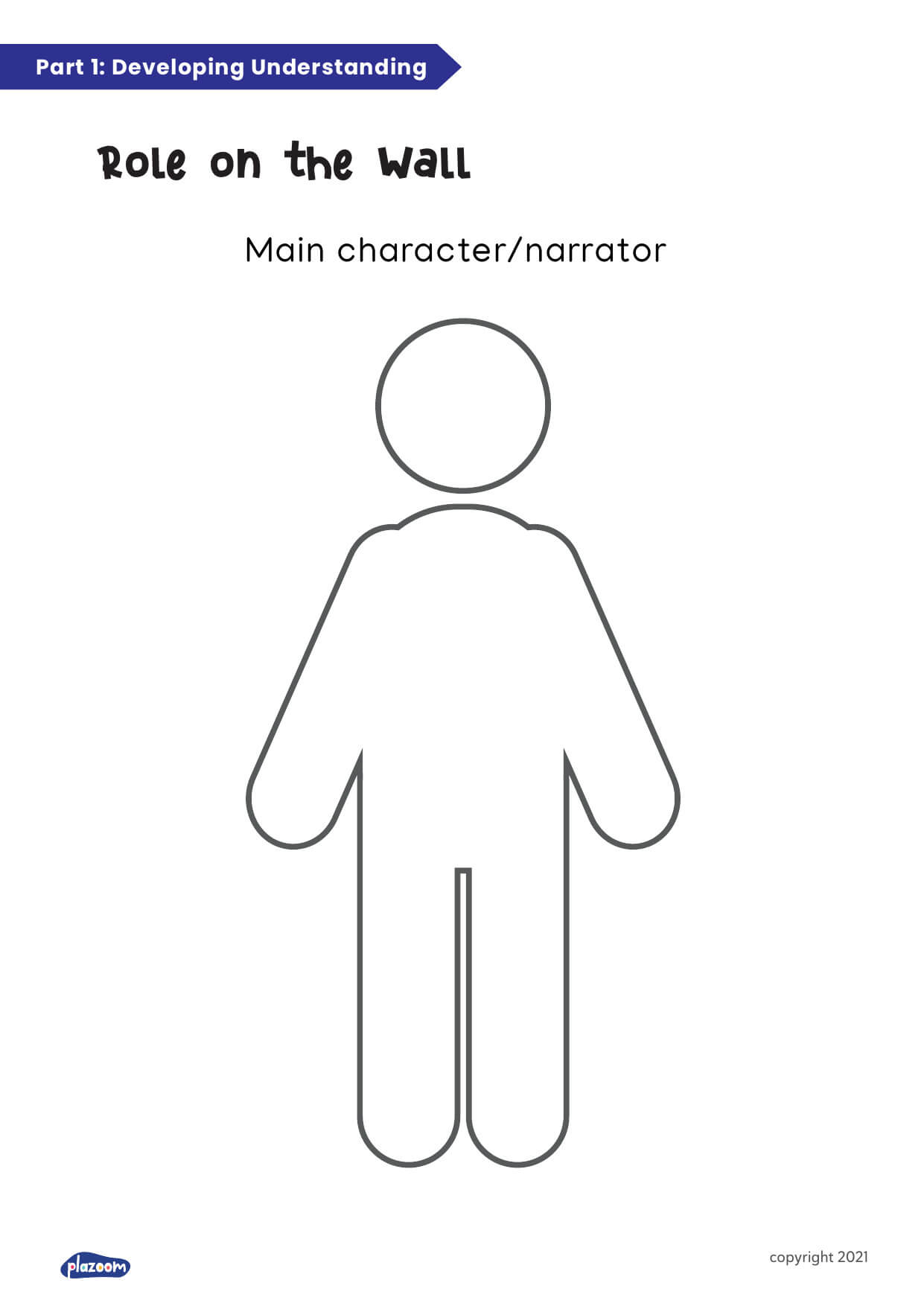
These activities build the habits of analysis, reasoning and evaluation. They support children in making meaning independently, not just passively expecting it to appear.
Vocabulary: unlocking the text
We know that a reader’s vocabulary size is one of the best predictors of reading comprehension. Yet it is easy to assume that once children are fluent decoders, they’ll “pick up” word meanings as they go. In truth, many will miss key ideas if some words aren’t taught deliberately.
With Musical Truth, for example, words like protest, solidarity and marginalisation have meanings beyond a dictionary definition.
We need to teach these words explicitly, exploring their roots, contexts and how they connect to children’s knowledge.
Similarly, in The Light in Everything, words linked to emotions and relationships, such as resentment, resilience and reconciliation will need to be explored for the children to interpret the actions and infer the feelings and motivations of the characters.
Background knowledge: the silent partner
As the DfE Framework makes clear, children can’t understand what they don’t know. In Musical Truth, children may not know about the political movements or social conditions behind certain songs.
In Freeze, they might not understand the genre conventions of Gothic fiction. And in The Light in Everything, they may not have first-hand experience of blended families or emotional trauma.
That doesn’t mean we don’t read these texts. It means we build the bridge using KWL charts, mind maps, or nonfiction companion texts (just a handful of useful strategies) to illuminate the context, making comprehension of complex text much easier.
Year 6 reading comprehenion strategies that actually work (and why)
Here is a small selection of strategies for engaging Year 6 readers in real texts...
Layered reading
Instead of reading once and asking questions, layered reading involves:
- Model reading by the teacher (with think-aloud)
- A shared and/or choral read
- Paired reading, often with roles (eg one reads narrative, one dialogue)
- A jump-in read, where children take over and read in character
Emotion graphing
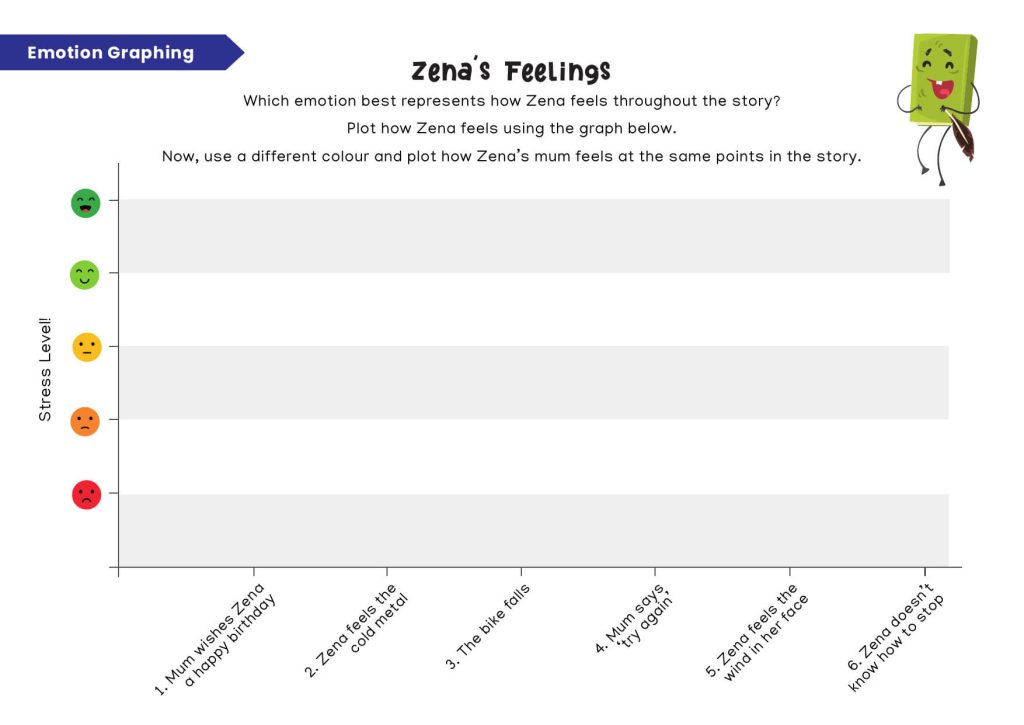
This involves plotting a character’s emotional journey across the text. Children place events on a graph and discuss the highs and lows (the y-axis ranges from very negative events/emotions to positive ones). It encourages close reading and revisiting the text to justify ideas.
One-sentence summaries
After reading a section of text, children write a single sentence summarising the context, message or mood of that passage. Then, they compare and revise it after reading the next section. This relies on inference, the ability to summarise while noting what is important, and awareness of authorial intent.
Role play and hot-seating
As mentioned, drama strategies allow children to embody characters and explore motivations. Drama is an essential part of exploring narrative (both real and imagined) at a deeper level.
What this tells us about curriculum, pedagogy, and progress
Everything above reinforces the fact that reading comprehension can not be reduced to a list of strategies or ‘reading domains’.
It’s not about identifying question types or scanning for keywords. It’s about building meaning through knowledge, language and thought.
When we select whole texts that offer complexity, diversity and depth, and that represent a range of genres, we give children the chance to encounter new ideas, practise the process of reading and connect reading to the wider world.
Ruth Baker-Leask is director of education consultancy Minerva Learning. She is an experienced school leader and runs an English leader network in the West Midlands.
A proven approach to Year 6 reading comprehension
Reading comprehension in Year 6 isn’t just about preparing for the test. It’s about preparing for a life of reading with understanding, curiosity and purpose.
When we teach comprehension through expertly-written texts, we help children become readers in the fullest sense and build lessons that are engaging for children and teachers alike.
That’s where Real Comprehension comes in.
It’s our close reading programme that supports Year 6 comprehension through structured, thematic units.
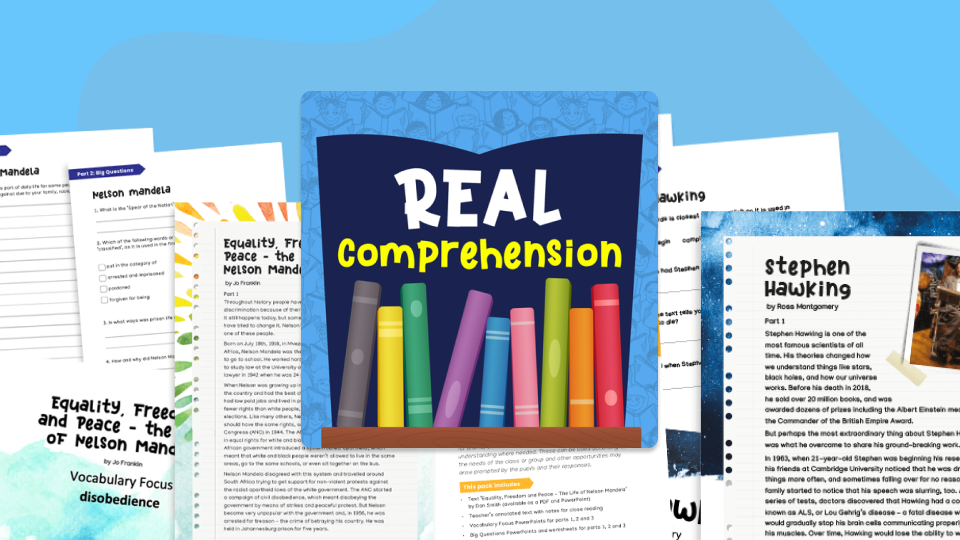
Pupils revisit the same text multiple times, gradually building a deeper understanding. Each unit focuses on a single theme, explored across three text types: fiction, non-fiction and poetry.
Key features of the programme include:
- Annotated texts with teaching prompts
- 'Big Questions' to drive classroom discussion
- Vocabulary slides and morphology work
- Drama and visualisation activities (eg role-on-the-wall, conscience alley)
- Tasks like sequencing and true/false for SATs-style practice
- Creative personal response opportunities
Created by experts
Real Comprehension was created by a team of four leading literacy consultants – Christine Chen, Lindsay Pickton, Rachel Clarke and Ruth Baker-Leask. With over 45 years’ combined experience supporting UK primary schools, their goal was to make teaching comprehension in Year 6 more effective and less stressful.
They’ve designed each unit to be flexible, adaptable and grounded in best practice – with everything a busy teacher needs to deliver quality lessons with confidence.
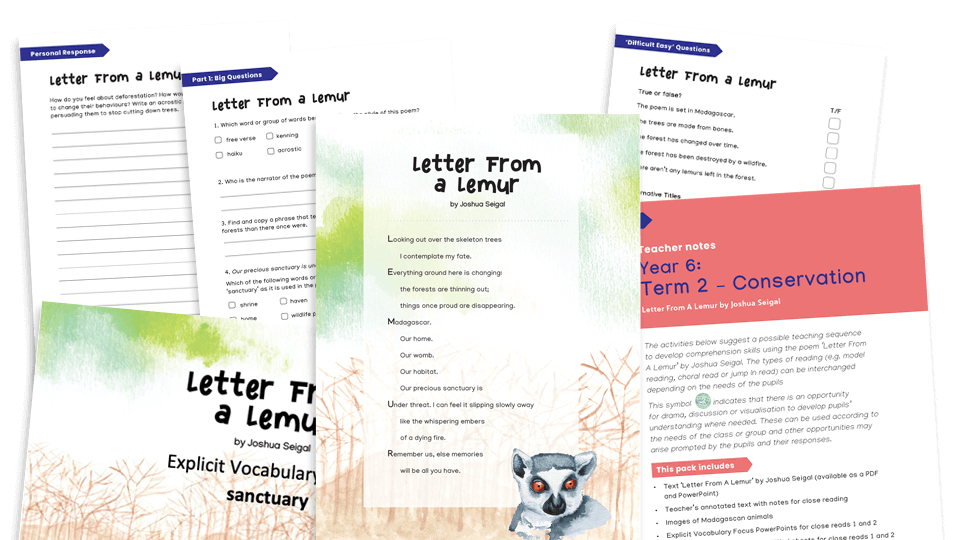
How Real Comprehension supports the Reading Framework
The DfE's Reading Framework stresses that strong comprehension comes from reading widely, talking about texts and building both vocabulary and background knowledge. Real Comprehension supports this with thematic units featuring fiction, non-fiction and poetry that promote rich discussion and repeated engagement.
Vocabulary knowledge is key – not just knowing words, but their meanings in context. Real Comprehension integrates vocabulary teaching within authentic, engaging texts written especially for Year 6.
Comprehension involves multiple strategies like predicting, questioning and visualising. Our programme encourages these naturally through discussion prompts, drama activities and creative tasks.
Explore our thematic Year 6 reading comprehension units
We've got a fully resourced unit built around a meaningful theme for each term of Year 6. These themes help pupils make links between texts and reflect on their own experiences.
Every text in the Year 6 units was written specifically for the programme by award-winning children’s authors who understand how to engage this age group. Authors include:
- Dan Smith – writer of Metamorphosis and other acclaimed adventure books
- Joshua Seigal – poet and performer known for school visits and stage shows
- Sue Hardy-Dawson – poet and illustrator who champions reluctant readers and pupils with SEND
This means your class gets authentic, meaningful writing – not dry extracts or worksheet filler.
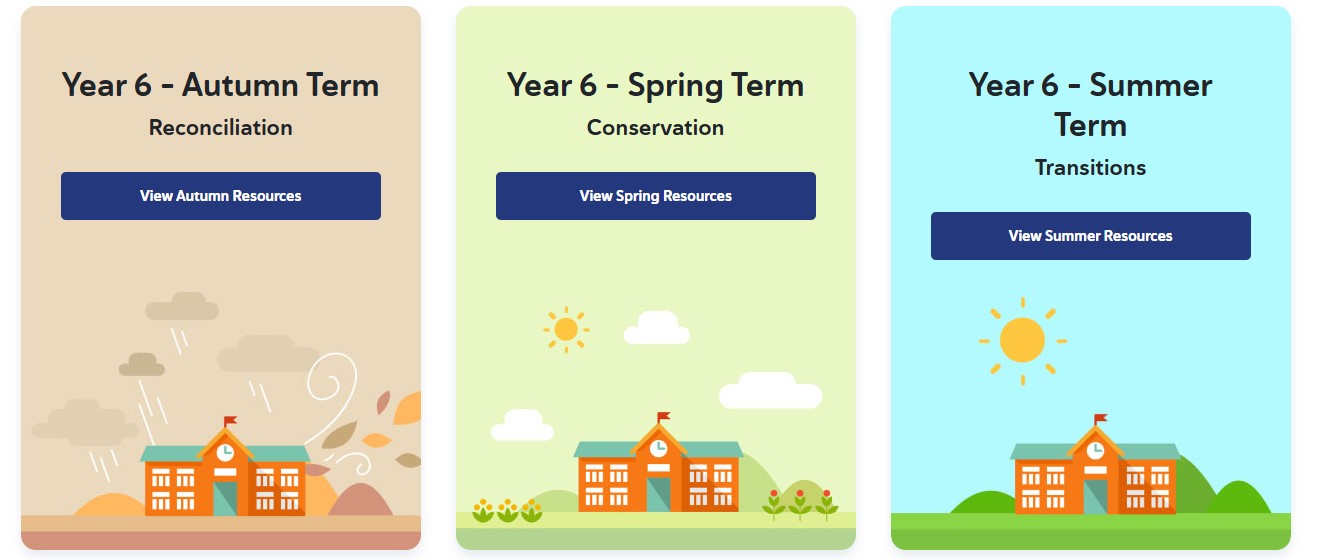
Autumn Term: Reconciliation
Our Reconciliation unit helps children explore forgiveness, empathy and moving forward – from the resolution of global conflict to the rebuilding of personal relationships.
This unit provides rich opportunities for class discussion and emotional literacy, helping children see that reconciliation can be both powerful and personal.
Curriculum links:
- History: WWII – a significant turning point in British history
- Relationships education: caring friendships, conflict resolution
- Geography: how people and places are shaped by history
Texts include:
- Together Again (Poetry by Joshua Seigal) – A thoughtful poem that explores the emotional landscape of broken and repaired friendships.
- Coventry Cathedral (Non-fiction by Jo Franklin) – An inspirational text explaining the story of Coventry’s two cathedrals and the city’s message of peace.
- Better Than a Box of Gold (Fiction by Jon Mayhew) – Set during WWII, this story follows an evacuee and a bully as they discover common ground and the value of kindness.
This unit builds children’s ability to retrieve, infer and interpret while also supporting PSHE objectives around empathy and conflict.
Spring Term: Conservation
In this unit, children engage critically with one of the most urgent issues of our time: protecting the environment. Through engaging and accessible texts, our Conservation unit promotes awareness, activism and cross-curricular links to science and geography.
Curriculum links:
- Geography: biomes, climate zones, land use and sustainability
- Science: living things and their habitats
- Citizenship: understanding roles in improving our environment
Texts include:
- The Conservation Conundrum (Non-fiction by Gabrielle Kent) – A magazine-style article that introduces environmental threats and explores ways people are responding.
- Letter from a Lemur (Poetry by Joshua Seigal) – A poignant and creative poem that gives voice to an endangered animal.
- How We Saved the Plazoom Oak (Fiction by Gabrielle Kent) – Told through a fictional class blog, this story follows pupils as they rally to protect a local tree.
The unit encourages collaborative learning and persuasive writing, while building Year 6 reading comprehension skills like summarising, sequencing and evaluating viewpoints.
Summer Term: Transitions
Our Transitions unit provides reassurance and reflection as children prepare to leave primary school. The theme of change – both emotional and physical – is explored through science, poetry and narrative, helping children process their feelings and build resilience.
Curriculum links:
- Science: evolution, adaptation and life cycles
- PSHE: transition, emotional development, self-confidence
- Literacy: shape poetry, first-person narrative, non-fiction report writing
Texts include:
- Metamorphosis (Non-fiction by Dan Smith) – A captivating comparison between animal transformation and human change, supported by layered reading, dictogloss and vocabulary tasks on words like undergo and vessel.
- Many Roads (Poetry by Sue Hardy-Dawson) – A shape poem inspired by The Road Not Taken, encouraging children to reflect on choices and futures.
- A New Beginning (Fiction by Dan Smith) – A first-person account of starting secondary school, filled with honesty, optimism and humour.
Children practise retrieval, inference and personal response, with plenty of opportunities for discussion, creative expression and emotional preparation.
Why Real Comprehension works for teaching Year 6 reading comprehension
Teachers love Real Comprehension because it:
- Saves hours of planning time
- Supports key reading skills in an engaging, inclusive way
- Builds vocabulary and inference through close reading
- Encourages deeper thinking, discussion and creativity
- Provides essential SATs preparation while avoiding over-reliance on test papers
Whether you're looking for a full-term programme or flexible inspiration, it's a powerful tool for boosting reading comprehension in Year 6.